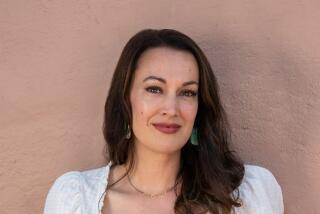A Poignant Follow-Up to ‘The Liars’ Club’
- Share via
Mary Karr has always had a wobbly relationship with Leechfield, Texas, the town that formed her, nurtured her and, eventually, slingshot her out across the vast desert toward California. Karr first returned to Leechfield in her critically acclaimed memoir, “The Liars’ Club”; she does so again in “Cherry,” which tells the story of her teenage years and her quest for intimacy in experience, in sex, drugs and the proverbial rock ‘n’ roll. “If there was any place worthy of escape. . ,” she writes in “Cherry,” “it was Leechfield with its mind-crushing atmosphere of sameness.”
It is the late 1960s. Sex--either getting it or stopping it--seems to be on everyone’s minds, Mary’s included. The people around her either mirror her own sense of wonder or display an intense aversion to the very mention of the deed: There’s the friend who says a novena every night to grow breasts (and succeeds); Mary’s mother, who puts her on birth control pills at age 14 . . . just in case; a gynecologist (in another city) who admonishes Mary for her (presumed) promiscuity and tells her that his own daughter would remain “intact” until marriage; the boyfriend who, Mary tells us, is “hardwired to procreate, to get the deed done”; and the high school principal who tells her that without math she’ll “wind up being nothing more than a common prostitute.”
Despite its title, “Cherry” transcends that single sexual act, seen in so many cultures as an instantaneous transition to adulthood. It is a bittersweet look at first kisses, first loves and first times, those mutable moments that somehow become trapped like insects in amber, recalled later by smells and sounds but never fully recaptured. But it is also a layered examination of the many ways in which we grow from children to adults, assembling ourselves as unique individuals, separate from our families and our villages.
For Mary, maturity, in a certain sense, came long before this memoir begins, in learning to live with her parents’ vodka-tinged binges and their on-again-off-again marriage. So too did the physical act of losing her virginity; as Karr writes in “The Liars’ Club,” she suffered a rape and a later sexual assault before age 9. Becoming an adult, for Karr, then, is the search for honesty in her relationships and in herself. Reflecting later on her own first love affair, she remarks, “How odd . . . that you embarked on [it] with such a large sexual secret in tow.” Drugs, like sex, fail to provide her with the intimacy she desires. In the years that follow this memoir, drugs only evoke the sad histories that now accompany Karr’s memories of youthful indiscretion: of friends killed in deals and highs gone wrong. In “Cherry,” Karr suggests that even as a teenager, she needed more than the psychedelic dreamscapes drugs offered: “[A]fter so many goodbyes and so many hungover mornings, you long for some steady state.”
Unlike “Liars’ Club,” which is, mostly, a chronological telling of Karr’s seventh and eighth years, “Cherry” jumps through time, from the moment Mary leaves Leechfield back to when her wanderlust began. The stories that occupy its pages were once, it feels, pushed to the margins of what she needed to tell in “Liars’ Club.” Only now are they allowed to roam freely, in a narrative that shifts between first and second person, all the while capturing the wistful feeling intrinsic to the onset of adolescence. Karr the storyteller reflects the “shape shifting” that Karr the protagonist seems to feel: Sometimes she is little more than an observer, a minor character in her own personal history.
Through these scattered perspectives, we begin to understand the woman who tells this story, who shares her insights and briefly foreshadows all that comes afterward. As much as “Cherry” is a coming-of-age story, it is also the explanation of how a woman can emerge from her tangled history, how, though she must move far beyond a place or certain experiences to find understanding, she is, ultimately, shaped by them. To close the pages of “Cherry” is to realize that for Karr, life has been, as a friend of hers once predicted, full of “[b]ig adventures, long roads and great oceans.” She has found the intimacy she always craved and has, in turn, become what she always dreamed of becoming. And in that truth, there is tremendous power.
More to Read
Sign up for our Book Club newsletter
Get the latest news, events and more from the Los Angeles Times Book Club, and help us get L.A. reading and talking.
You may occasionally receive promotional content from the Los Angeles Times.







